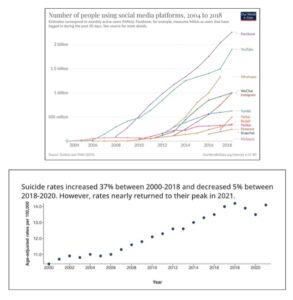
This is one post in a series of posts from The Smith Firm regarding personality disorders in marriage and divorce. This series is directed to those leaving a narcissistic relationship and the challenges that may be present in leaving, staying gone, and thriving after. We hope this helps those who are going through this. If you are experiencing symptoms of depression, suicide, or any of the symptoms identified, we recommend you contact a mental health professional or call 988 to connect with someone immediately.
The origin of the term “Narcissism” is Greek mythology. Specifically Narcissus, the handsome young man who rejected the attempted advances of the nymph Echo. He was punished by way of falling in love with his reflection in a pool of water. He was consumed by his image and wasted away on the shore pining away for himself.
Contemporary Narcissistic Personality Disorder is identified by symptoms that include 1) Grandiosity, self-importance, entitlement, arrogance, and expectations of favorable treatment. Basically, the contemporary individual who will only enter through the VIP line, and loves to make sure everyone knows they are living the VIP lifestyle. They are consumed with their own image.
In the era of smartphones, where technology captures moments in breathtaking detail, a shift has occurred in how we document our lives. The selfie, a photographic self-portrait often taken with a smartphone, has become a ubiquitous expression of our experiences. However, the ramifications of this phenomenon go beyond just capturing memories; they delve into the realms of narcissism, envy, and the growing emptiness fostered by social media.
Smartphones have revolutionized photography, rendering expensive cameras of the past obsolete and causing shifts in the job market for photographers. Now, it’s not just about capturing the world around us; it’s about placing ourselves at the forefront. As we photograph iconic landmarks, the self looms larger in the frame than the celebrated structure. This shift signifies a change in focus – from the external world to the internal self.
Recording travels to exotic places through selfies has given rise to a portrayal of a glamorous lifestyle on social media. Platforms like Facebook and Instagram provide an ideal medium for sharing envy-inducing episodes of our lives. However, the question arises – is this portrayal an accurate reflection of our experiences, or is it an attempt to win a socially competitive game? The pursuit of defeating others by projecting a rosier lifestyle, often divergent from internal realities, draws parallels to narcissistic personality traits.
In this competitive social media landscape, winners are those who make their followers feel less than them, inflicting them with FOMO – the fear of missing out. The relentless effort to broadcast a wonderful lifestyle contributes to the inflation of self-image. Social media encourages behaviors akin to those with narcissistic personality disorder, perpetuating a cycle of comparison and discontent.
The facade of glamour often reveals deep-seated issues. Influencers, who amass millions of followers for their seemingly perfect lifestyles, may secretly grapple with depression and suicidal thoughts. The stark contrast between the envy they inspire online and their internal struggles highlights the emptiness, fakeness, and peril of a social life conducted predominantly in the digital realm.
The internet, while bringing immediate access to vast information, contributes little to happiness. Adolescents, spending increasing amounts of time online, experience heightened loneliness. The solution isn’t found in virtual interactions but in real-world social contact. Recognizing the need for genuine connections, some English public parks have introduced “chatty benches” – spaces where individuals declare their openness to conversing with strangers.
Those with Borderline Personality Disorder (BPD), a mental health condition characterized by a pattern of instability in interpersonal relationships, self-image, and emotions, social media can be a gateway to a darkness that may be hard to shake. Symptoms of BPD include intense mood swings, instability in relationships, fear of abandonment, unstable self-image, impulsivity, and suicidal ideation.
Research studies and analyses have explored the potential connections between social media use and mental health outcomes, including suicide rates. While some studies suggest a correlation between heavy social media use and negative mental health outcomes, including depression and anxiety, establishing a direct causal relationship remains challenging. The trend lines of social media usage and increased suicide rates are obvious and should be considered when engaging with social media or allowing children to do the same.

Given the covariant relationship between social media usage and suicide rates, its clear that social media is playing a role in the mental health of users, and its impact on the fledgling narcissists and those with personality disorders should not be ignored or minimized.
As complex problems often have simple solutions, combating loneliness involves breaking the cycle of online isolation. If you feel lonely, the remedy isn’t found in the digital world but in a conversation with someone in the real world. Embrace the simplicity of genuine connections, fostering a sense of belonging beyond the confines of social media. In a world dominated by the selfie and FOMO, real conversations might just be the antidote to the emptiness we feel.
If you suspect you are living with a family member with Narcissistic Personality Disorder (NPD) or Borderline Personality Disorder, their social media accounts are a window into their personality and may provide evidence which will help you determine how to address the issues you’re facing.
BPD and NPD are mental health issues and should be treated as such. Either can result in mental and emotional abuse, or even physical abuse. The severity of symptoms can vary, and not everyone with narcissistic traits meets the criteria for a clinical diagnosis of Narcissistic Personality Disorder. Diagnosis and treatment should be conducted by qualified mental health professionals based on a comprehensive assessment of the individual’s symptoms and functioning. However, when married to an NPD it may prove impossible to obtain help and treatment for the NPD. In that scenario the decision must be made to stay or exit the marriage.
The Smith Firm attorneys understand the issues faced by a husband or wife living with a spouse with a personality disorder and we are prepared to help you navigate the issues unique to your situation. Contact us at (405) 843-1000 or confidentially at firm@thesmithfirm.net.